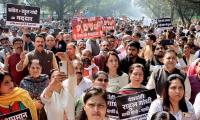
So do you know anything about India?
That is among the first questions most first generation Indian-Americans ask when they hear my American accent. It infuriates me. I yearn to tell them: Yes, ma'am/sir, I am very much in touch with my roots, thank you.
My parents worked hard to instill Indian values into my younger sister and me when we were growing up. We were raised reading Amar Chitra Kathas. We were raised to understand the meanings of the shlokas we recited, to fully appreciate and respect the God we were praying to. We were raised learning Vedantic philosophy and the true meaning of Sanatana Dharma. We were taught all religions reach the same God and being a Hindu meant believing this important principle.
At school being Indian was a tough test of individuality. My parents insisted I wear a bindi. It gave something for the other kids to make fun of me, and I went through a phase in which I hated everything Indian.
Why couldn't I have a more 'normal' American name? Why was it every time we went to any American restaurant the first five minutes had to be spent explaining to the waiter everything we wanted was vegetarian?
Yes, I resented being Indian.
But as I entered my late teens, I started to view my ethnicity as a badge of honor. Part of understanding who I was required me to accept my heritage and insist others respect it as well. No longer would I let people mutilate my name; I would insist they pronounce it correctly. No longer did I dread having to explain why I wear a bindi, or why people have to take their shoes off when they enter my house.
Being Indian is part of who I am and I am proud of my heritage. In college, exploring my ethnicity became one of my main pursuits. I became vice-president of the Indian Students' Association, organized Indian community functions.
Everyone who knows me well knows how proud I am to be an Indian-American. For the most part, my coworkers and friends respect me for living a blend of cultures, possessing a mixture of values that include the best of Indian and American ways of life.
But I still have people asking me, "So do you know anything about India?"
I have found American-born Indians make a huge effort to be in touch with their heritage. No matter how hard we try to completely assimilate into the society here, there will always be questions asked about our heritage, because of the colour of our skin.
Yes, I speak American. But I know about India. I know being Indian has helped me to be a better American, to take the best of both cultures and make one of my own.








